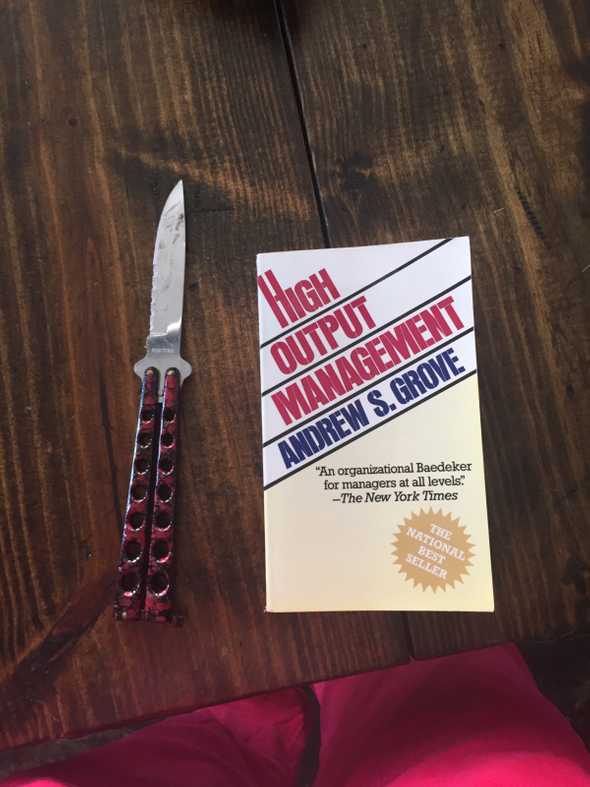How Not To Be the Pointy Haired Boss
You have a moderately successful company. Maybe it is the first time that you have an opportunity to stop focusing on what is going to kill your business next. If you are lucky you have focused on and hired on core values. You have the right people on the bus, but the bus is still slowing down. Fuck.

Alright so this obviously is not going to scale. How the hell do you scale a company? Management. Most people cringe at the word and convulse at the topic. Everyone associates management with the shittiest pointy haired boss they ever had. Many people have never even had a good boss. The most common reason for anyone to leave a job is that they do not like their boss.
A good boss is not enough to retain people, but a bad boss will definitely make them quit.
This article is mostly geared toward people considering management and in management, but now might be a good time to make a brief point about management selection before the higher ups turn away:
You need managers with enough street credibility that are dedicated to creating the best jobs possible for everyone else.
The worst thing you can do is turn your best individual contributor into your worst manager. Individual contributors are successful because they know something. Knowing something and knowing what you know is important in management. But gut check — if they are interested because they want to make the decisions they do not understand the job. Most of the job is enabling and delegating — not doing or deciding.
Your best managers are also never your worst individual contributors. They are someone that has the respect of the team and the humility to know what they know and what they do not know. This is important because it ensures the right decisions are made upstream and downstream. If poor decisions are made upstream your best people will leave. Period.
My mentor gave the simpliest description of a good boss versus a bad boss.
A good boss is a shit umbrella. A bad boss is a shit funnel.
When all sorts of crap is happening and coming down from up on high, you can smell it and are perfectly aware, but none of it is landing on you. That is a good boss. If all that crap is heading their way and is landing right on you that is a bad boss.
Let’s circle back to that good boss again. Did you notice that they are a shit umbrella and not a shit bubble. A good boss does not hide the landscape from their employees. Company is doing shitty? Everybody knows it. Not everybody feels it the same way as management and leadership, but everyone is aware. Tactically, if you are the boss, you need to shelter people from the shit that doesn’t matter, remove obstacles, and still hold people accoutable when they fuck up the shit that does matter.
“The culture of any organization is shaped by the worst behavior the leader is willing to tolerate.” Gruenter and Whitaker
Start with the core values. When the situation gets stressful you need to hold yourself to your core values and hold everyone else to them as well. It is that simple. Is your best employee being unpleasant, hostile in debates, and yet getting stuff done? Nip it in the bud. No one person on the team matters more than the health of the team. If that person is you then you need to get away for awhile. Take a break. Even during crunch time.
A general rule when negotiating anything — only one person is allowed to be angry at a time. If both people are angry, y’all need to step back, clear the air, and then get back to attacking the issues. Nobody is perfect, but you need to be crystal clear about when to stop arguing.
Something you and your direct reports both need to know is how they prefer to take criticism and how you prefer to receive criticism. If you have not had this conversation then stop what you are doing and have it today. Nothing is going to set anyone off worse at the end of a bad week than some criticism received in the wrong manner.
At anytime during the day you need to have the confidence, tact, and understanding that is your job to the police the core values and hold everyone, especially yourself, accountable. If you can’t tactifully pull someone out of the room to discipline them that is a problem.
Most importantly — lead by example. Be the hardest working, be the most positive, be the most supportive, be the most self-starting, be the most open, be the most empathetic, and be the most exceptional. You are Caesar’s wife and you need to strive to be beyond reproach. You will fail. Improve.
“If you want to tell people the truth, make them laugh, otherwise they’ll kill you.” -Oscar Wilde
If you want to have criticism received well then you have to have a relationship with that person. People swallow criticism a lot better when they like you. Meet with all of your direct reports weekly; share information on the health of the company, let them air their issues, tell them what they are doing well, and tell them what you want to see change. If you are blessed with humor this is a good time to use it. Conversely, I’d avoid the shit sandwich. It does nothing more than make the critic feel good by reducing the clarity of your criticism. It feels just as bad giving the same person the same criticism again. Aim for clarity over your feelings.
“It is amazing what you can accomplish if you do not care who gets the credit.” Harry S. Truman
As a boss, you are best off not sharing credit. Do not try. Give away any good ideas you have and give them out freely. Praise anyone that executes on them generously. Pass that praise up. Hopefully you have enough good ideas that you cannot execute on all of them anyways and we all know that the execution matters more than the idea. Accept your new role as chief cheerleader. With any luck, you have smarter people working with you. They will take your relatively mundane ideas and do amazing things with them.
“As a middle manager, you are in effect a chief executive of an organization yourself….As a micro CEO, you can improve your own and your group’s performance and productivity, whether or not the rest of the company follows suit.” -Andy Grove

What is it that you know better than the rest of the team? Delegate it. It is much easier to monitor something you understand. It is also arguably the best way to transfer that knowledge to the rest of the team.
Talk with your direct reports and other departments every week. Especially in crunch time. You cannot know anything about your people or your organizations problems if you don’t spend time with those people. Respect their problems. Write them down. Follow up. At SalesLoft we use both a team-wide tool called 15Five and private notes of the in-person one-on-ones shared directly between managers and their direct reports.
“An ounce of prevention is worth a pound of cure” Benjamin Franklin
One of the best ways to get leveraged output is to use your knowledge to get ahead of issues for your team and aggresively attack them. A common mistake is only applying this principle when shit is not on fire. Shit being on fire is a clear sign that you need to work on this principle. Hell, the quote above was given in the context of firefighting. Get ahead and thwart issues before they are issues.
The best advice I can offer is be honest and open. Nothing is worse than a bad boss that doesn’t know they are a bad boss because nobody will tell them. That is how you become the pointy haired boss.
My goal is simple I want to create the best engineering jobs imaginable.